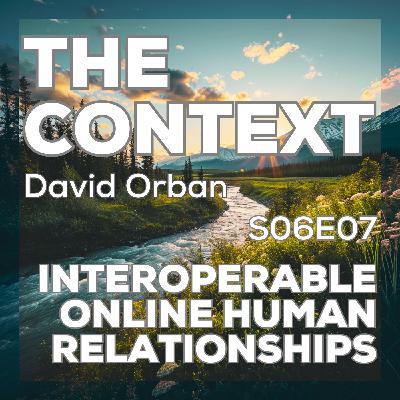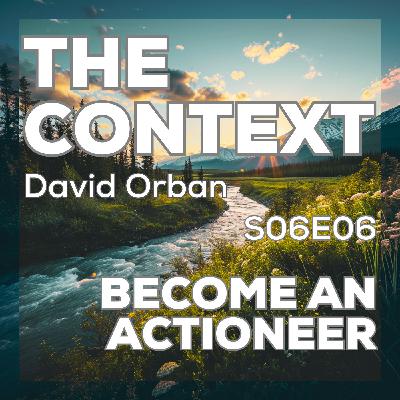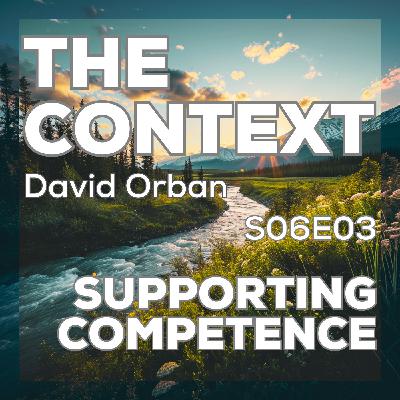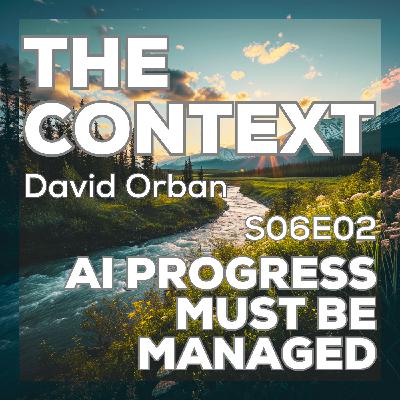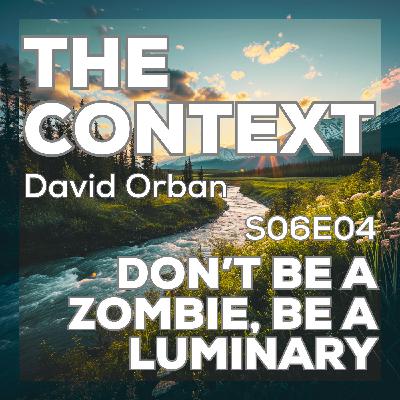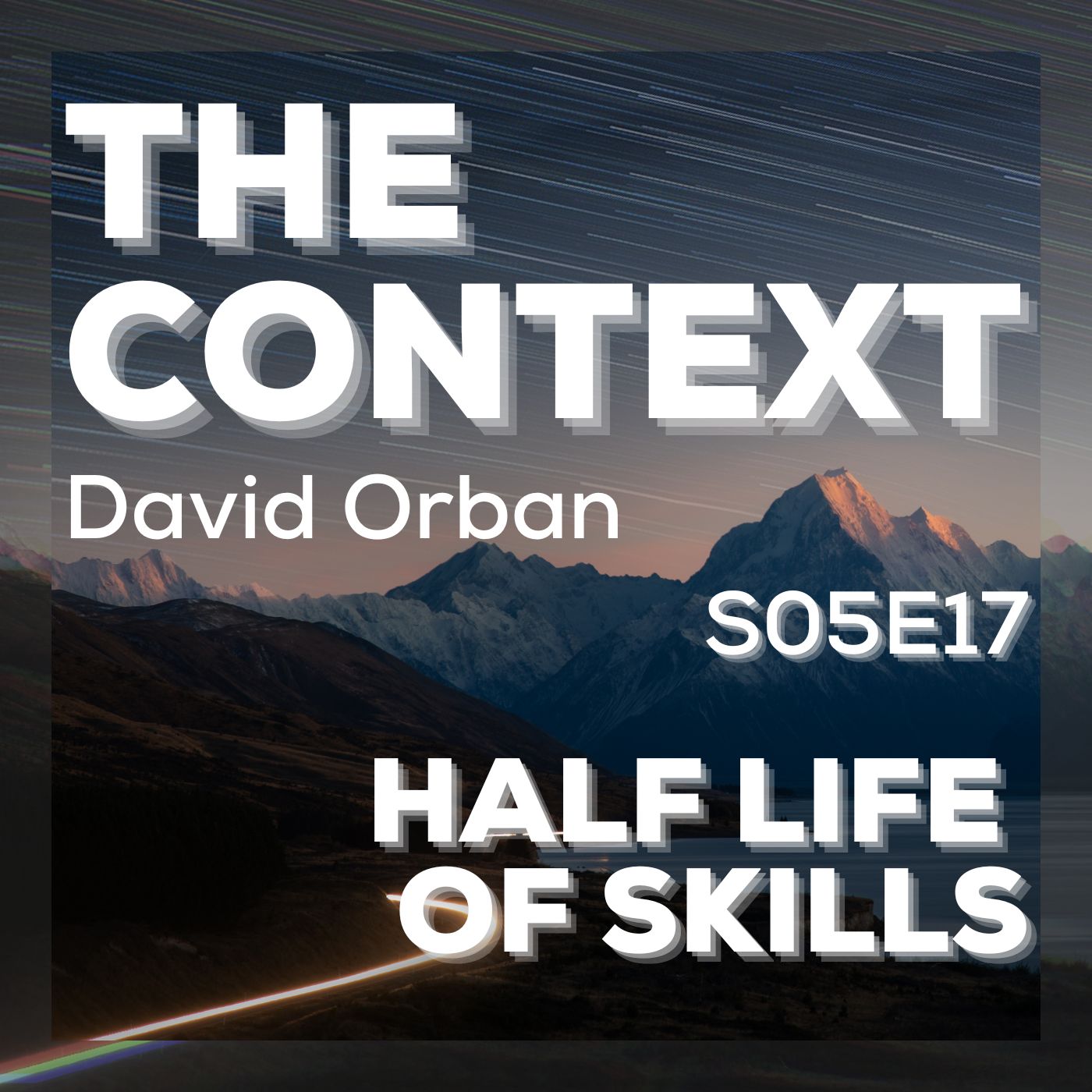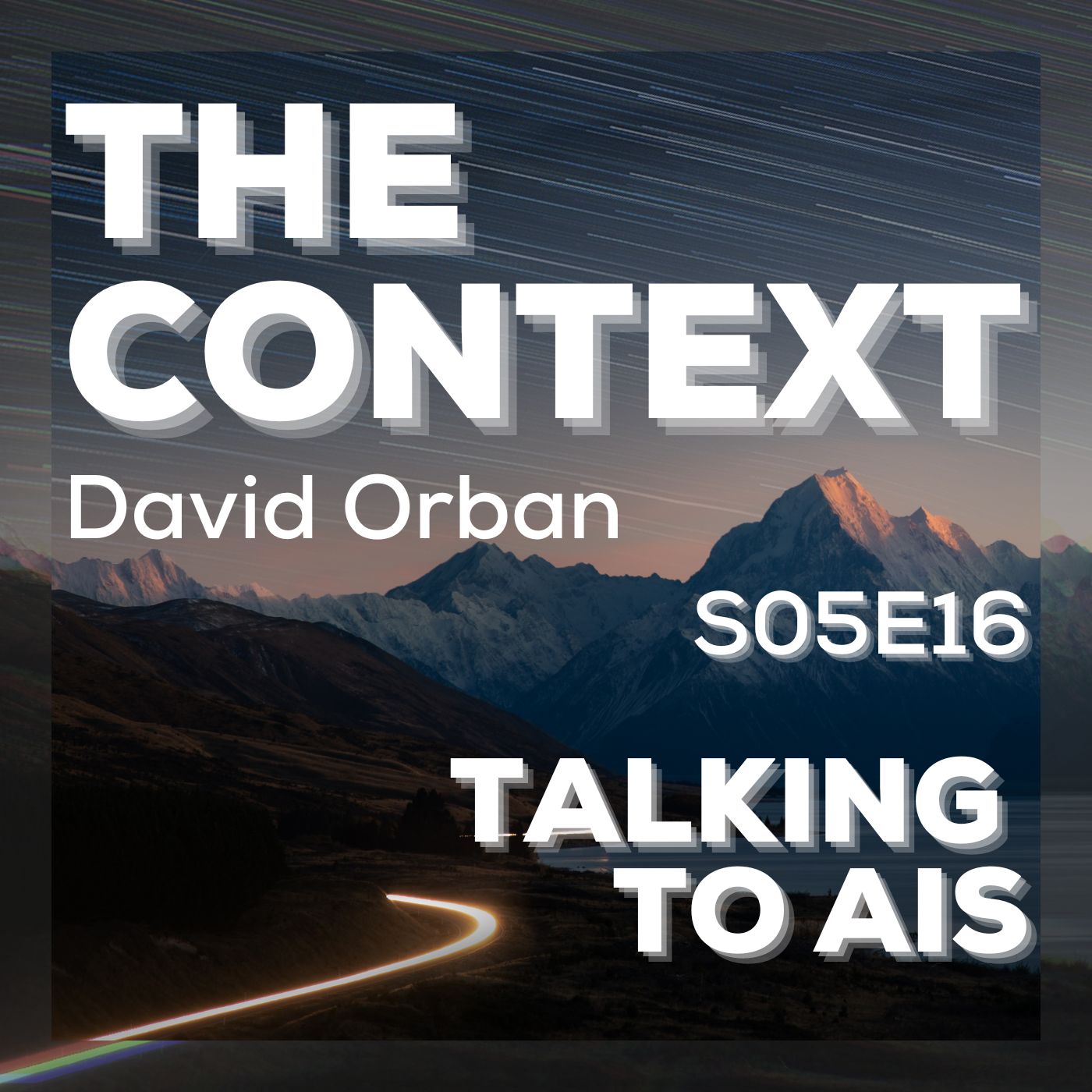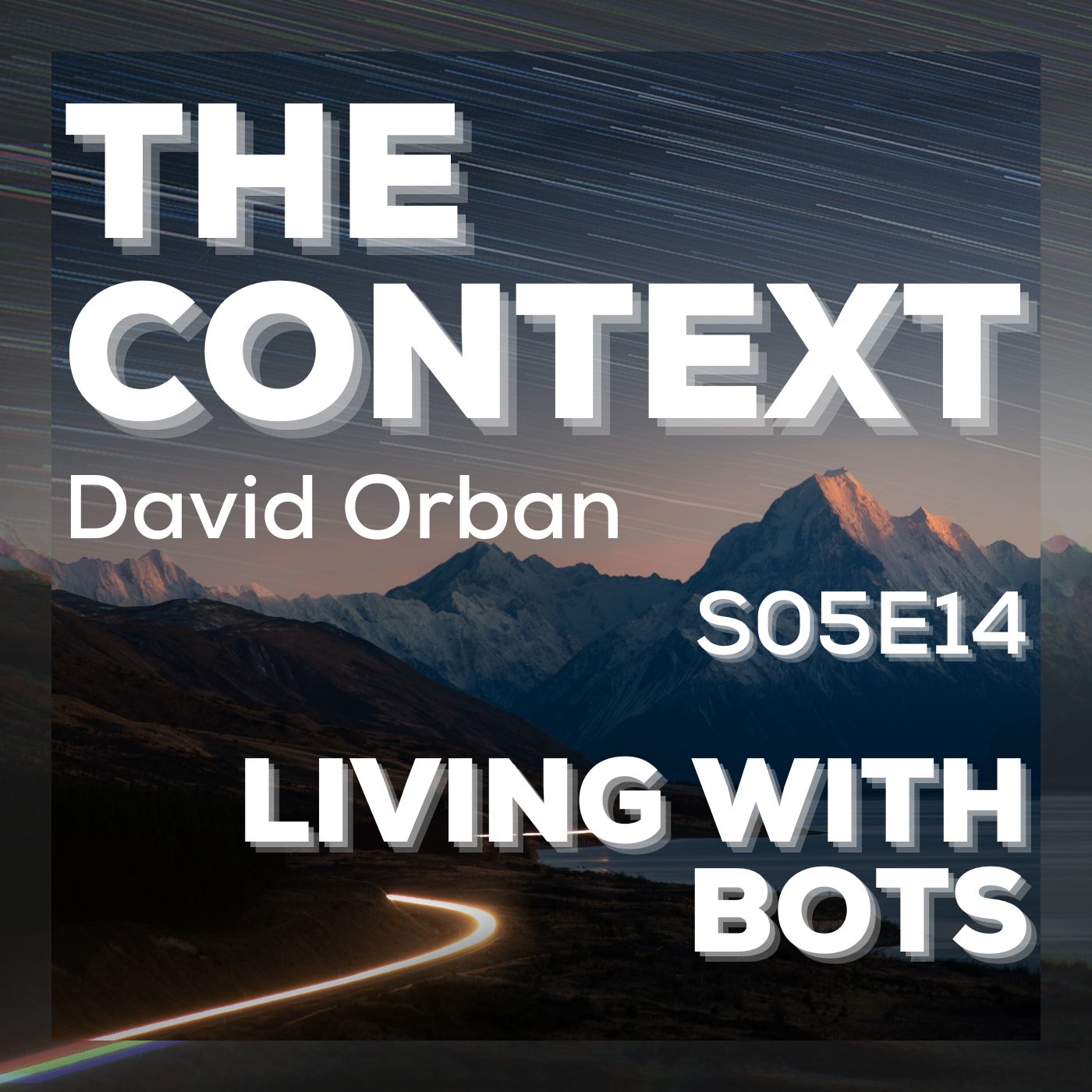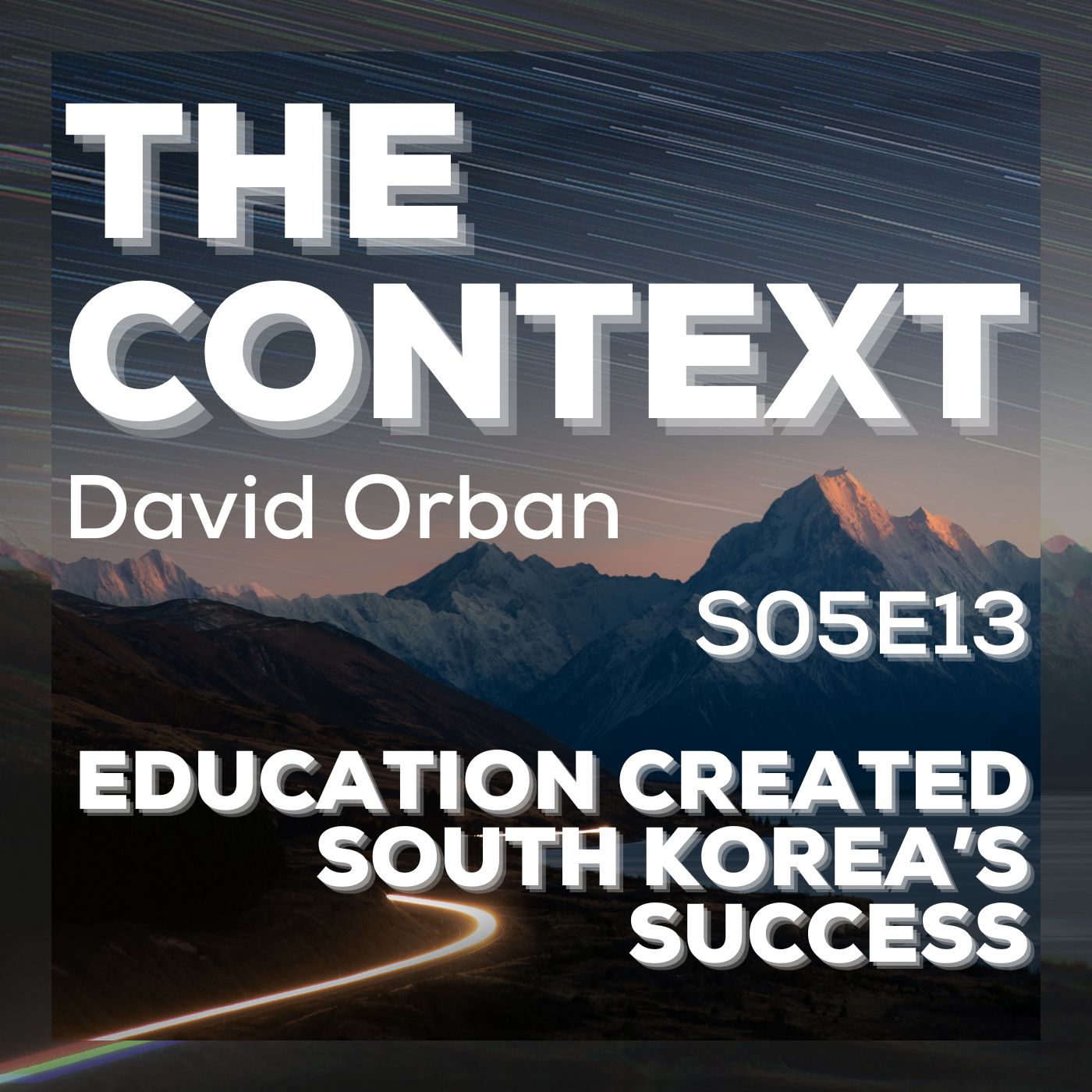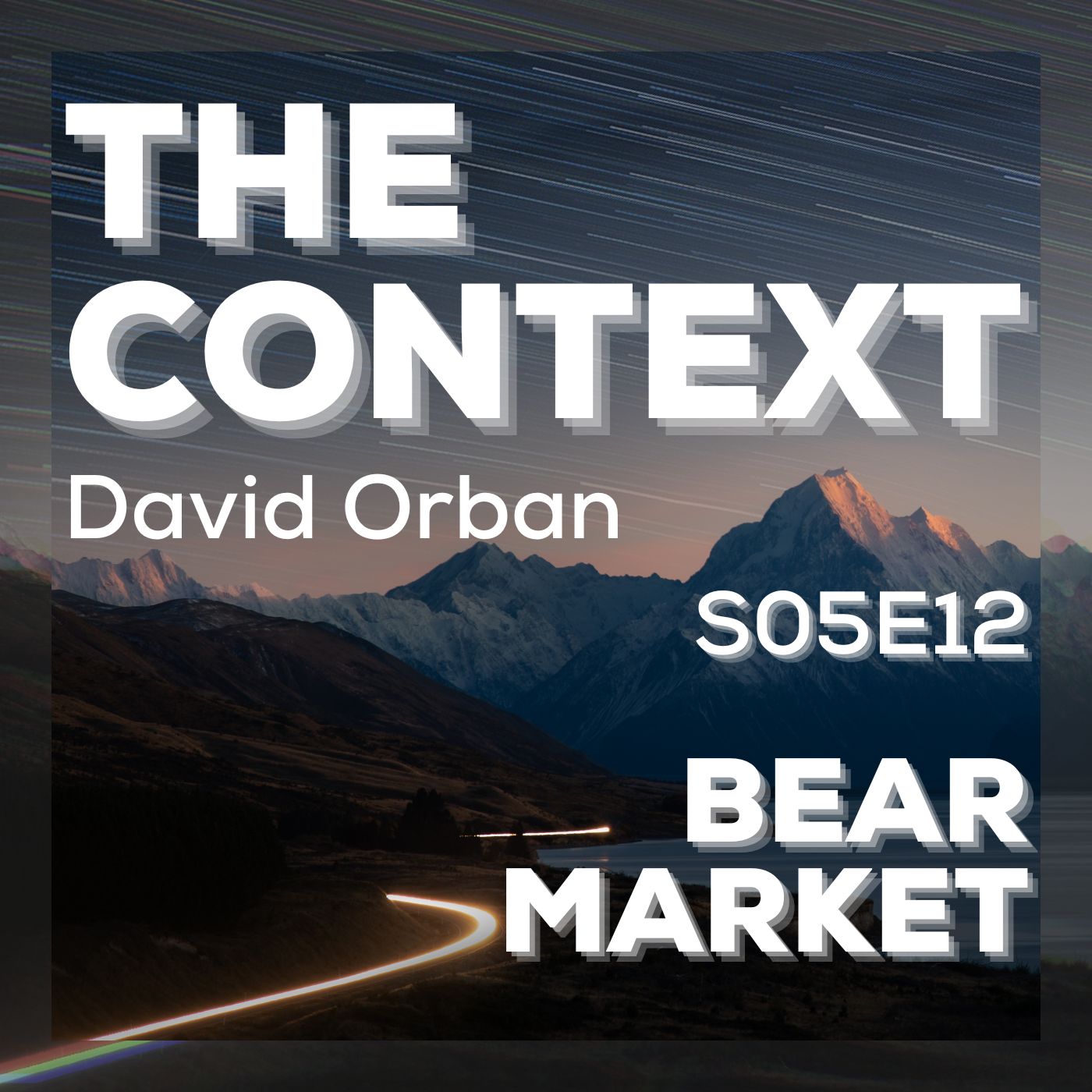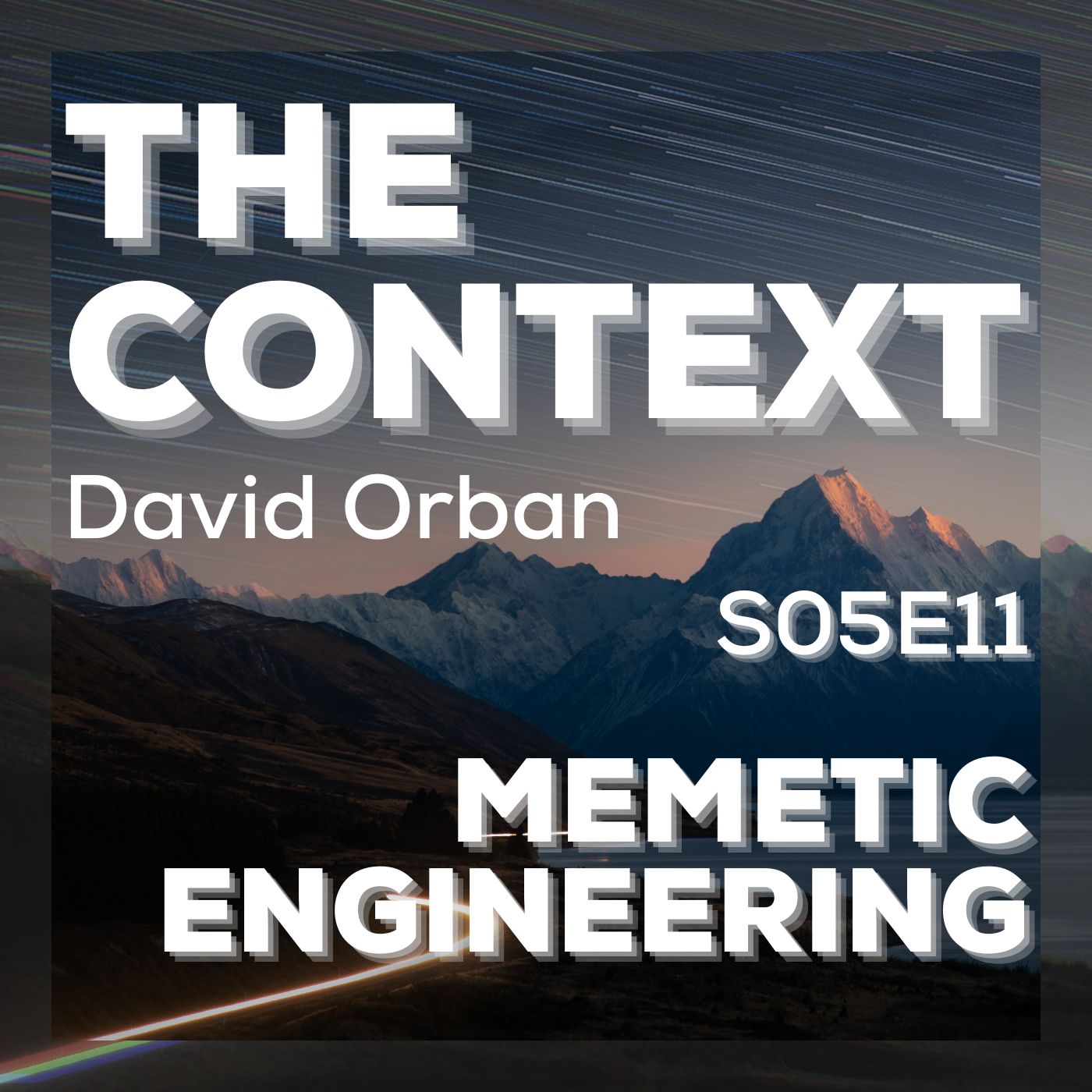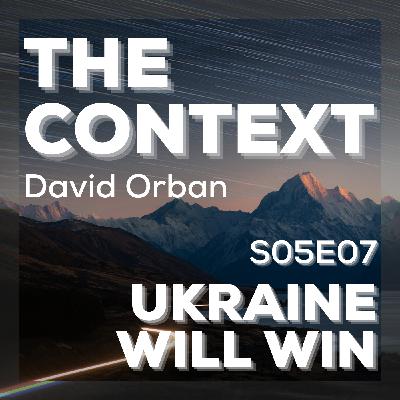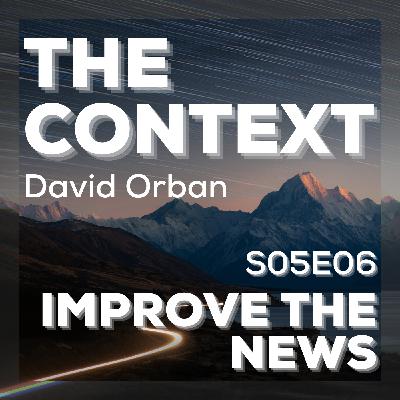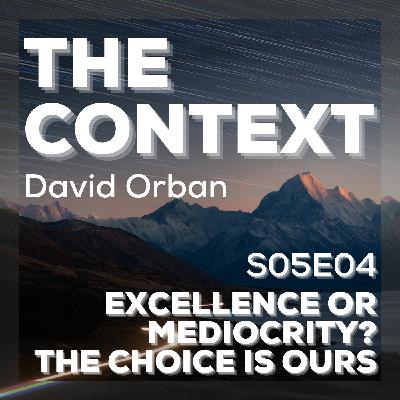Discover The Context Podcast - David Orban
The Context Podcast - David Orban

The Context Podcast - David Orban
Author: David Orban
Subscribed: 0Played: 14Subscribe
Share
David Orban © 2024
Description
"The Context" looks at themes and trends, news in technology and society, aiming to allow those who watch it to gain a broader understanding of why what we are observing is happening, what are its possible consequences, and how we can turn this understanding into action.
113 Episodes
Reverse
You may not realize it, but there are important connections linking emails, short vertical videos, and infographics - three of the most popular mediums for online content. Their ability to effectively engage audiences relies on the twin pillars of interoperability and human creativity.
This analysis looks at the unexpected reemergence of email newsletters, despite social media’s early dominance. It explores the surprising rise of short video clips on TikTok, YouTube and other platforms. And it examines why static infographic images continue capturing attention in an increasingly automated world.
By illuminating these relationships, key insights emerge on what drives success for each format now and into the future:- Email’s resilience owing to its universal protocols- Cross-platform video sharing, though not without fragmentation challenges - The ongoing popularity of infographics, fueled by human graphic design skills- Striking the right balance with AI-generated content moving forward
As technologies progress, grasping these pivotal connections will prove vital. Understanding how these different formats complement one another allows us to better navigate the ever-changing digital landscape.
Actioneer is a new AI-powered startup coaching platform seeking to make high-quality advice and mentorship affordable and accessible to founders globally, helping unlock entrepreneurship and enable more people to find solutions, create jobs/wealth, and design exciting, satisfying lives.Check it out and sign up for the waitlist on http://actioneer.ai
Recently, I attended a nine-day Vipassana silent retreat, and I’d like to share my experience with you. Firstly, my perspective is limited. I’ll describe the organization and activities of the retreat I attended, but I can’t compare it to others. My insights stem from a 2,500-year-old tradition, so while they are genuine and fresh, it’s advisable not to rely solely on my experience. That said, if you can set aside nine or ten days from the modern way of life to immerse yourself in such an experience, I highly recommend it.
Vipassana is a meditation technique founded by Gautama Buddha Siddhartha around 2,500 years ago. It was embraced by what later evolved into the Buddhist tradition, and it was passed down orally for many years. The practice remained mainly in regions like Tibet, India, and present-day Bangladesh — where Buddhism was prevalent. About a century ago, it began to gain broader attention, particularly when Tibetan monks, fleeing China’s invasion and accompanying the Dalai Lama, began sharing their practices. By the mid-20th century, teachings were being translated from Sanskrit, the original language of the practice, into English and subsequently other languages. I’ll refrain from using too many Sanskrit terms.
Commitment is crucial. Throughout the silent retreat, participants don’t speak, read, write, use devices or even make eye contact. The aim is mental purification and enhancing concentration by eliminating distractions. Our group consisted of about 70 individuals, predominantly women, with about a dozen men. While we weren’t segregated, women and men were spatially separated during meals and meditation sessions. We were housed in a monastery in Northern Italy, sans monks, and enveloped in silence.
The recent SpaceX Starship test launch has important implications for space exploration. Is the media focusing too much on the negatives, such as the explosion, and overlooking the intricate process and the efforts made by thousands of skilled individuals? How important is it to celebrate our civilization's accomplishments and support the enthusiasm and proficiency of SpaceX and its team?
The iterative, rapid improvement process that SpaceX utilizes is clearly working as shown by remarkable achievements of the Falcon 9 rockets. It is important to acknowledging the hard work behind it, and the competence of professionals.
AI is experiencing jolting change, with advancements such as ChatGPT and GPT4, but there are limits to individual and organizational adaptability.
I was invited to sign an open letter that asks to allow for deeper consideration of AI design, implementation, and regulation.
Concerns include inherent bias, job displacement, pollution of the info-sphere, loss of trust in communication, and potential dangers of Artificial General Intelligence.
The benefits of AI and AGI are immense, but responsible development and planning are crucial for harnessing these benefits and mitigating risks.
I lived alone for three months while my wife was in Seoul, for the first time in 40 years.
In today's world we receive a constant stimulation of inputs, and requests for outputs, in the search for efficiency, and the effort of reaching our goals. Without trying, I unexpectedly discovered how much I enjoy solitude, and the silence. It not only was refreshing, but made me more focused and productive, as well.
What are the implications of advanced Artificial Intelligence on our understanding of consciousness and self-awareness? We have to strive for self-discovery and introspection, embracing a "luminary" mindset, fully aware and engaged with our experiences and emotions.
As AI continues to advance, it is vital for individuals to distinguish themselves from the mindless, automatic existence of a zombie and actively participate in building a future worth living.
When deciding what is worth developing in terms of professional skills, there is an important concept that I would like to talk about: the Half Life of Skills.
I'm often asked for advice about skills that are worth developing or learning, and I am always very happy to provide my feedback. These questions come from people of all ages, and this is very appropriate, because those who are not very young anymore, who are not at the beginning of their professional trajectory, can and should invest in themselves in order to maintain and improve their ability to provide value to the businesses that they work together with.
This is especially important in terms of what I call the half life of skills. If we decide to invest our attention, our resources, our time in a given direction, we have to take into account the opportunity costs that arise unavoidably. For example, our professional time is limited even if measured in decades, so we definitely want to maximize the return on the investment that we are making in developing a new skill.
So understanding and analyzing what is the likely life lifecycle of these technical skills enables a person to make very valuable judgments on the investment that a particular direction deserves. I hope that, alongside the other useful parameters of prioritizing certain skills, you may decide to use this concept of the half life of skills as something that you also find valuable.
We often imagine technology in our science fiction scenarios that is very different from what happens when it becomes available. Today, we are starting to talk about Artificial Intelligence that is not exactly like what was depicted in the Sci-Fi books we were reading decades ago.
There has been an explosion of experimentation in the past years, and now there are tools available, at least in preliminary beta versions, for neural networks of very large sizes that can provide paragraphs of text or images from an initial prompt. GPT-3 is an example of the first generating text from a prompt, and it has become the basis for numerous applications. DALL-E-2 and MidJourney are examples of platforms that generate images while being assisted and powered by Artificial Intelligence, where the prompt will produce a particular picture.
Yes, sometimes the robot would end up doing a different thing from what is asked, but this conversation between the robot and the human, it can lead to something bigger, something greater. Right now these neural networks have billions, hundreds of billions and soon, trillions of parameters, but I look forward to when they’ll be trained to handle even more large amounts of data.
What we are doing right now is not the definitive way that we are going to use to interact with AIs, and it’s already something that not everyone has the patience to learn and to follow. Some people will not want to keep experimenting and improving until the result satisfies them; they will want faster and easier ways of going about their business using Artificial Intelligence. But in the meantime, I think this current phase is very precious since it shows how large the space of creativity enabled by AI is.
This new level of creative scenario is going to be possible, but in the meantime, understanding the power of these tools and the unlimited universe of creation is accelerating, and I am so happy that these tools are available to anyone. Anyone can get their hands dirty and understand the power of Artificial Intelligence today, and I invite you to do so. Even if it's just a test with just a handful of images, you will be able to call yourself an artist and learn to interact with the superpower of Artificial Intelligence, which will help you create a better future.
Are you worried about bots, and spam accounts and fake accounts on the various social media platforms? You could decide that this worry should be translated into some kind of eradication of the bots problem, but I want to argue that the opposite is true. We must welcome bots, and learn to live together with them in a peaceful and constructive coexistence.
It is definitely the case that on social media platforms there are a lot of accounts that do not necessarily correspond to a single human. For example, if an Internet of Things sensor uses Twitter in order to communicate the temperature, the humidity or whatever other parameter that it extracts from the environment, and someone else takes advantage of that value incorporating it in an application after it is publicly available on Twitter, is a completely automated non human account, which is certainly not spam or fake. So you can have those accounts that want to defraud, scam or trick people into doing something that at the end will harm them on one hand, and on the other hand there are those accounts that are very useful, even if they are bots.
What should we use? What should we decide? What should we keep the power towards? Can we expect each account to have an ID card to prove their human identity? And can we pretend that each human should only be able to do it once forever? I don't think that it is reasonable to expect that we should do that, and those platforms that will try will find that it is either impossible or undesirable since the value that we will lose by imposing this is too large. On one hand, we must enable anonymous and pseudonymous participation on online platforms for many reasons, but on the other hand, it can be argued that the increase of non-human powered human-like accounts can be valuable, they can play a useful role as well.
I think every platform should ask themselves the same question: “Why are we prohibiting bots? Shouldn't we allow them? And if we do, how should they behave on the platform after explicitly declaring their nature?” Let's see if there will be platforms that understand that this is the future, because I assure you, every year that it passes, the number of bots is going to increase, potentially, and that is definitely going to be the case may be in a decade or two, eclipsing the number of humans and we should rather than feared future, prepare for it, embrace it, and understand how to thrive in it.
What can profoundly define the trajectory of a country over the course of a couple of generations? In the case of South Korea, the answer is clear: It is the belief in the value of education, as well as the dignity and the benefit that it can provide.
I was in Seoul, the capital of South Korea. It is a very interesting and buzzing city of over 10 million people in a nation of 50 million. South Korea has been classified in 2021 as a developed nation by the United States. This means that until then, it was classified as a developing nation. As a matter of fact, it was extremely poor out of the Second World War and out of the Korean War in the 50s, for example 80% of the population and more couldn't read or write. Today, it is a major technology hub, an exporter of television sets, mobile phones, cars, brands like Samsung, LG, Hyundai, Kia, that are known worldwide. Over the course of just two three generations, it has been able to bootstrap the entire nation into the premier league. Definitely, the local culture contributed fundamentally to this. The belief in the value of education and in the belief that not only students, but institutions and teachers and families, of course have to work together in order to achieve the desired outcomes.
Today, the question is not whether this approach works, because it has proven to work, but the question is how to adapt this approach to the current new realities. The extreme pressure on the students is visible in the suicide rates that are very high. “The necessity to achieve and to succeed is not complemented by an understanding that failure can be part of it, and that failure is not an end of the road, but it is maybe a bump or maybe a learning experience instead”.
The challenge, of course, is how to stay competitive, how to maintain the growth in the domestic product. That has been the traditional measure of economic success, and certainly improved the material quality of life of South Korea. The wealth and income inequality in the country is high, and the Social Safety Net is insufficient, especially in protecting the elderly who are living in poverty in very large numbers, a percentage that is close to 30% of the South Korean elderly living in poverty. Like in many places in the world, Seoul and South Korea live in contrasts, and these contrasts are unavoidable. They are preferable than total homogeneous equality that gives no opportunity to excel, no opportunity to achieve no incentive to work on self improvement that benefits the entire society. However, these contrasts need to be managed; for South Korea and Seoul in the coming years and certainly decades, the new challenge is going to be how to adapt, how to not only achieve material wealth, but balance and psychological, mental well being in a society that has been able to push itself to succeed, but it must not crumble upon the responsibility of succeeding at any cost.
We are in a bear market and more and more countries in the world will very likely declare over the course of the next few weeks or months to be in an economic recession. What are the implications for investors and founders of startup projects?
When we think about investors, we think about them as a homogeneous group, but in reality there are many different types of investors, like angel investors or managers of venture capital firms, and each of them have slightly different incentives, perspectives, timeframes, expectations of returns on their capital. Basically, traditional equity investment in startups needs about six to eight years to earn a return, and that period of time is actually sufficient to bridge recessions that may last a year or two.
If we consider this information, then it is somewhat surprising when immediately at the first signals of a bear market, or the first signals of a recession, you immediately read that the investors are investing less money, or at worse terms than before. One of the reason for this is the financial of course, but there is also a psychological one: during the bull market there is a rush to take a position in an exciting project, and the maesters trample each other, so when things are slowing down then everything is more calm, then they can take their sweet time to decide.
From the point of view of startup founders, bear markets are very hard, either to start or to survive, depending on the phase their startup is at. It must immediately react by freezing hiring, dismissing people from their project, and laying down on their marketing activities. The uncertainty of the many variables that need to be under control is frustrating, if not even panic-inducing, but at the same time the opportunity to actually start a project and in a bear market is great since the project will be less pressured in making decisions.
The Crypto market itself is a variant of these behaviors in a more compressed timelines. For many, the expectation was that whether Bitcoin, Ethereum, or cryptos different from these two main ones would be counter cyclical to the public stock market. Those people were surprised by the decline in technology stocks on NASDAQ or on other stock exchanges, and the decline in cryptocurrency prices would be going somewhat in lockstep.
I am not a trader, I cannot predict what is the short term variation of stocks or cryptocurrencies. There are people who believe technical analysis helps them draw certain lines, and they believe that these lines indicate trends that will support their trading assumptions. Good luck to them, but what I believe is that the ingenuity of talented teams and the desire of investors to earn a return by backing themes that come up with innovative solutions over large numbers and sufficient amounts of time will reverse the current bear market, the current recessions, and we will come out in a few months in the case of the crypto market, or in a few years, in the case of the public markets, and the global macroeconomic conditions, hopefully stronger with increased productivity and innovative solutions all around.
The purchase of Twitter by Elon Musk is a concrete step in understanding how the evolution of ideas can be turned into mathematics and mimetic engineering, which will play an increasingly fundamental role in a world dominated by Artificial Intelligence and advanced technologies.
Technology is feeding on itself. It is the expression of our understanding of the world, and how we can structure the implementation of this understanding in a way that serves our purpose. When technology accelerates or when the rate of acceleration is even increasing, ideas matter even more than before because ideas stop being just a theoretical, philosophical, academic set of discussions among people who dream of what could be, but never step into what they can do, either because they don't want to or they are not able to.
When we talk about free speech, we are not only talking about what is worth talking about, but we are talking about what is worth doing. And there will be another step: when humanoid robots will be available, and they potentially enable us to live alternative lives. For example, one of those robots might live on Mars and another on the moon, while a third one may be in a form that is not humanoid at all. Even so, they’ll still might bring a human consciousness to the stars. How will we relate to the possibility of our own consciousness inhabiting one or more of these bodies? What will be the conversations that we are going to have, when these are going to be real possibilities?
Some of these will probably never happen, but can we afford not talk about them? Can we afford to not debate in a healthy, open, energetic, but civilized manner? Can we afford not to build the necessary defenses against those ideas that we establish or harmful instead of being beneficial?
You might ask: what is Twitter's role in all of this? Well, my question is if Twitter is going to be the final platform where the science of mimetics and mimetic engineering turn into concrete day to day reality. It probably won’t, but I believe that under Elon Musk's ownership, Twitter will accelerate our ability to understand what kind of debates, what kind of platforms, what kind of tools we need, in order to accelerate or even increase the rate of acceleration of our ideas.
We must understand what works, what does not work, and with our increased ability to turn ideas into action. Being able to do so is something that everyone should aspire to acquire.
Does Bitcoin matter? Does Bitcoin care? What do you think about it?
The President of the United States believes that Bitcoin indeed matters. He labeled it a potential threat to the national security of the United States of America.
I don't think that Bitcoin cares about what the President of the United States thinks about Bitcoin, which is kind of the point; for 1000s of years, the way that we designed the money was such that what people thought about that particular kind of money influenced the money, and the behavior of that money and the rules under which that money would be able to exist.
What will be the next step? The next step is that Bitcoin will still not care. Bitcoin will still do its own thing, the network that will enable anyone to transfer value in an unfettered manner and without any possibility of nation states stopping it or organizations interfering. The European Union, for example, is the latest to delude themselves that they will be able to stop Bitcoin. The European Parliament voted a few weeks ago a resolution that will be implemented in all the member states that will impose reporting requirements on Bitcoin exchanges that are stricter than not those imposed on any bank. A bank is required to report on the source and the destination of a transaction when it is larger than the equivalent of $10,000 or 10,000. Euro. The rule that is now going to be imposed in Europe is for this reporting to apply at any amount being transferred; it is frankly, ridiculous, and it is not going to achieve whatever supposed desired effect the legislators felt they would need to act in order to achieve because Bitcoin doesn't care.
You should care about what the nation states are doing, and I am looking forward to understanding that you are caring, but you should also care for yourself and be fine with the fact and recognize your ability to let go of the feelings that you have towards Bitcoin, because Bitcoin doesn't care.
#finance #bitcoin #money
What is going to take to move Bitcoin and Blockchain and crypto from 10s of millions, maybe 100 million to billions of people adopting it and using it daily.
I'm here back in Dubai, where I will be speaking at conferences, talking about the various crypto technologies that are certainly very important. However, often, the teams that are analyzing how to improve these technologies, neglect other fundamental barriers to adoption.
So many wonderful technology solutions require dozens of difficult steps until you can do something, while others have a promise of providing you with great financial returns. However, they require a commitment and the ability to manage the risk that not a lot of people have. Finally, even though we speak English, and many of the people follow us as well, the vast majority of the people on the planet do not. It is crucially important to overcome these barriers if we want to scale crypto solutions to billions of people.
For the past few months, I have been working with a talented and passionate team that is building exactly that: CheetaX is focusing on India's 1.3 billion people, which is a huge market opportunity. Their current solutions for savings provide abysmal returns, and the population is ready to adopt something new. It has one of the largest Internet populations in the world, and smartphone distribution is huge: an estimated 800 million people have smartphones.
Now CheetahX wants to provide a very simple solution with easy onboarding, and the one-click decision for a bridge towards what we call DeFi Yield Opportunities, really simplifying what can be done. Not everyone in India speaks English or Hindi, and as a matter of fact, hundreds of millions of people speak neither of those two languages, but their local language.
CheetahX plans to release its application in seven languages to provide a necessary gateway to crypto adoption to these hundreds of millions of people, and the time is now because the infrastructure is here. The people are ready. We need to provide them with smart solutions. And we need to enable them to learn so that they can adopt crypto and its advantages. CheetahX is already providing the waitlist for signing up in their application, and they also have a native token that will be used as a reward token in their learning platform, and so many other ways.
On cheetahx.com people can already start understanding how they are aiming to approach this incredibly rich and promising market. Will India be only the first step? Will CheetahX go on to conquer Southeast Asia or Africa or other important markets? Well, we will see but the billions of people who haven't been using Blockchain and crypto solutions until now certainly have a new player that they can leverage If they want to make their first steps in this exciting world.
#india #crypto #startup
“The Cult of Done Manifesto” by Bre Pettis and Kyo Stark states that there are three stages of being: not knowing, action, completion.
There are three states of being. Not knowing, action and completion.Accept that everything is a draft. It helps to get it done.There is no editing stage.Pretending you know what you’re doing is almost the same as knowing what you are doing, so just accept that you know what you’re doing even if you don’t and do it.Banish procrastination. If you wait more than a week to get an idea done, abandon it.The point of being done is not to finish but to get other things done.Once you’re done you can throw it away.Laugh at perfection. It’s boring and keeps you from being done.People without dirty hands are wrong. Doing something makes you right.Failure counts as done. So do mistakes.Destruction is a variant of done.If you have an idea and publish it on the internet, that counts as a ghost of done.Done is the engine of more.
Bre Pettis wrote, together with Kio Stark, “The Cult of Done Manifesto” in 2009. He then went on to found MakerBot, and I'm sure he is doing exciting things today. At the time, when I read “The Cult of Done Manifesto”, it very strongly resonated with me; if you follow the context, you can still hear echoes in so many things that I keep often repeating in many of the subjects that I talked about. How important it is to test things out, how important it is to try new things, how natural it is to make mistakes. I am sure that there are dozens of more concepts that are smartly buried, and can take seeds from within this manifesto.
I recently had the chance to remember it because I am working with a very smart and passionate startup that is now coming out of their “stealth mode”. When you’re in this stage, no one knows what you're doing, and you are not ready to confront the crude reality of the world. But you must come out of your comfort zone, and face reality to receive both good and bad reception. Maybe you’re sharing your documentation, and people are trying passionately to poke holes in them, which is perfectly fine. If people just say “Oh, wow, this document is great. It is so inspiring, and there's absolutely nothing wrong with it”, what could you learn? How could you improve?
It’s better to hear this criticism and try to improve your idea and mentality: How much do you believe in what you are doing on one hand and on the other? How smartly Can you listen and incorporate what actually of the criticism makes sense? How can you distinguish between what you can safely discard and what instead matters to you? Of course, rather than discarding, you have answers that you are able to rapidly develop or memorize as needed and provide the answer to that criticism without trying to deflect it and acknowledging it, but also letting the other person understand that you actually thought about what they are saying.
Make mistakes, because now is the time. Look at Elon Musk, for example: he has 17 million followers, yet he still makes plenty of mistakes. Don't treat your social media with gloved hands, instead just post stuff that you can always delete. Just reach out. Just make it done.
#procrastination #motivation #doing
Russia's attack against Ukraine is the largest conflict in Europe since World War Two. There are countries that believe to be far enough to be able to ignore it, or to take a balanced stance without taking sides: they are wrong. In today's globally interconnected world, these conflicts have repercussions, the geopolitics of war in the 21st century leaves no one untouched.
Over the next weeks and months, missile attacks will continue, bombarding and destroying Ukrainian cities. The determination of the population will be crucial. If Russia is able to eliminate the democratically elected Ukrainian government, they will install a new one who will be friendly to Russia. But even if they were to declare victory with this government in place, that will not mean that they will have conquered Ukraine as a country. Putin's decision has fundamentally undermined his own rule, and has inflicted lasting damage to the political, economic future of Russia. The consequences are far reaching.
China is saying cynically: “Well, if we cannot trade in dollars, because unfortunately Russia is under sanctions, maybe we can trade in Chinese currency. By the way, we just introduced the digital Yuan. Wouldn't this be a convenient way of modernizing our economic ties?” India imports almost all of its weapons from Russia. And as the United States strengthened its ties with Pakistan in its fight against Afghanistan and the Taliban, India, the largest democracy on the planet, decided that cozying up to the Russian dictator was a good choice. During the Ukraine-Russia conflict they are pretending that they can afford not to take sides. That democracy and the democratically elected government is not worth supporting and defending, even with just a declaration of principle.
Over the course of the next few weeks, we will see a lot more people dying. And we will see conflict going on. The people of Ukraine and the country of Ukraine will come out of it winning and that the aggression that they are suffering currently will cease.
#ukraine #russia #ukrainewar
I am recording this episode of “The Context” on the day that Russia invaded Ukraine. I don't know what will happen in the next few days, but it’s guaranteed that there will be a lot of confusion, and our ability to make sense of the world will also depend on the kind of tools that we use to interpret the information that we receive.
We receive information from a wide variety of sources to a degree that hasn't happened before. We have television, YouTube, and other video content online. We have journalistic sources, as well as crowdsourced intelligence information that is coming from people on the ground. Most of us are not equipped with the tools that enable the correct aggregation and synthesis of these pieces of information.
In the past, we would rely on professional journalists to complete this task. Over the past 10 years or so, many people have started to look at the work of journalists as not only chronicling what is happening objectively, but giving a slant by expressing their point of view, or the point of view of their editorial board. There are many reasons, but this is a paradox; drinking from the firehose of information is beyond our human individual capacity, and we don't trust the interpretation and aggregation of the news by professionals.
Understanding that we are individually biased, and that our various sources are also unavoidably biased, should not reduce us to a paralyzed position of cynicism. Instead, it can be substituted by a more proactive stance with the help of innovative tools, like Improve the News.
Developed by MIT professor and researcher Max Tegmark and his group, Improve the News allows you to explore different points of view, and understand their merit, being exposed to them in a controlled fashion. Even if you end up confirming that you keep disagreeing with the alternative points of view, you can incorporate your knowledge of them in your worldview, to improve your future decisions.
#news #fakenews #information
Have you ever looked into the socks drawer of a horse? It's full of socks in ones, twos and threes, completely useless. Did you laugh? Didn't you? Well, that is the point. Either of those outcomes is fine.
I want to be a comedian. Do I want to be a comedian? My father was an actor, and he kind of made sure that I wouldn't actually go on the path of performing as an actor. But as a public speaker, I can feel that at least to some degree I would enjoy it, and maybe would be good at it. Telling a story, hearing the feedback from the audience, being able to read how they react, who are attuned to your speaking, who is maybe even riveted. And then, when I deliver a keynote, after I'm done opening the Q&A, I actually understand that people have been provoked into thinking, into asking themselves questions. These are indicators that possibly I could attempt to act as well.
Even seasoned professionals, comedians you admire, need the experience of developing the jokes, testing them and improving them until they work. And of course, during the process, they feel silly, they feel bad, they feel the hurt of the audience not laughing at the joke that doesn't work. So this is the same iterative process that I talk about so often, where you want to go somewhere, and you want to know what is needed in order to get there, but not exactly how it is going to play out. And as long as you are able to measure the outcome of a given step, you are able to improve, to try variants, until you achieve what you want.
The opportunity of going out on a limb, of getting your hands dirty, of making mistakes, of understanding how and when these things can work is part of the effort that makes the result valuable. The effort that distinguishes those who actually invest in the process, and those who do not. Knowing that we have put in the effort that we have made, the mistakes and that we have achieved our goal of making people laugh.
Watch the video until the end to hear my favorite joke.
#comedy #jokes #experiment
We want to excel, to succeed, we want to continue to adapt to the changing conditions around us. But, statistically speaking, we are average. How can we overcome the contradiction?
If you feel that you are smarter than the average in a particular group, you are probably wrong. This common condition is called superiority bias, and it is not one of the worst. We are all multi-dimensional people. There are so many ways that you can be seen and recognized objectively to be above average; you just have to realize that, on average, you are average. So how can you excel as an individual? You also have to realize that it is impossible to excel all around, across so many different parameters, so you have to pick the battles that you can win.
Organizations have the same problem constantly, both internally and externally. Observers will want to be able to conclude that the organization is improving and is beating its competition, but if you look over a certain period in a particular industry, you’ll see that it will have an average rating, and the likelihood that a particular organization in that group is average is statistically very high. You also have to consider that organizations tend to become more and more risk-averse, especially if they have been successful and achieved a certain position in their industry.
How can an organization avoid being seen as tending towards mediocrity? It is an effort in maintaining and improving company culture, it is an effort in allowing people to improve themselves by letting them learn, making them eager to learn. It is an effort in setting bars of objectives higher, constantly restructuring the organization as needed to make sure that it can achieve the harder objectives.
Being able to understand the origins of mediocrity whether in an organization or ourselves, is the first step to be able to recognize how we can improve and to what extent we can improve, understanding also the limits of this ability, and understanding how we can reach a life worth living and an organization that is generative, that contributes to a society, that makes this world a better place to be in and to thrive.
#excellent #mediocre #choice


